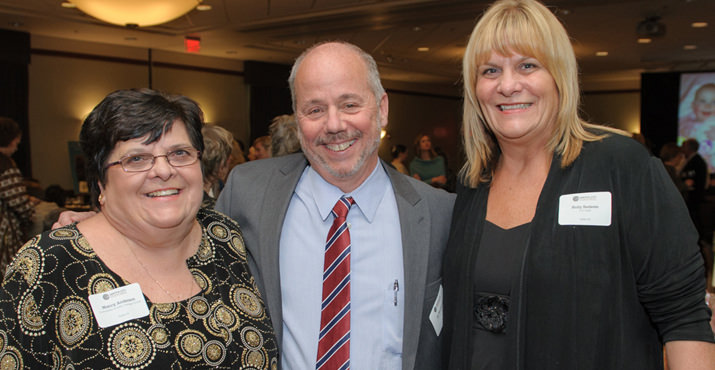
Central City Concern’s Tribute to Nancy Anderson Celebrates Family
Portland, April 11th, 2013. The “We are Family” event honored Nancy Anderson, co-founder of Letty Owings Center, and benefited Central City Concern‘s programs for children and families. Nancy Anderson, is pictured with Central City Concern Executive Director Ed Blackburn and Holly Redeau, CCC Program Manager of Family Housing. We are Family 2013 – A Tribute to Nancy Anderson raised over $52,000 for the Letty Owings Center and Family Housing at Central City Concern. The Letty Owings Center was created in 1989 and provides residential drug treatment facility for pregnant or parenting women. (It became a Central City Concern program in 1997.) Central City Concern provides housing, healthcare, employment and peer support to upwards of 13,000 people yearly.

Robert Church, a resident of Letty Owings Center many years ago, thanks Nancy Anderson for the impact the program has had on his life.

Carol Graven and Claudia Krueger, Central City Concern staff, sold raffle tickets for chance to win signed Blazer ball and tickets to a game next season. Proceeds from raffle will help children in our housing attend summer HOOPS camp.

CCC Board Chair Dean Gisvold, CCC Founding Board Member, Sally McCracken and current board member Pauline Anderson.
From Central City Concern:
Click to see a video about the program
Central City Concern meets its mission through innovative outcome based strategies which support personal and community transformation.
- Direct access to housing which supports lifestyle change.
- Integrated healthcare services that are highly effective in engaging people who are often alienated from mainstream systems.
- The development of peer relationships that nurture and support personal transformation and recovery.
- Attainment of income through employment or accessing benefits.
The success of these four elements results in an transformation of world view and self image from a negative to a positive outlook, enabling people to become productive citizens who want to “give something back” to the community.
Central City Concern (CCC) is a 501(c)(3) nonprofit agency serving single adults and families in the Portland metro area who are impacted by homelessness, poverty and addictions. Founded in 1979, the agency has developed a comprehensive continuum of affordable housing options integrated with direct social services including healthcare, recovery and employment. CCC currently has a staff of 600+, an annual operating budget of $41 million and serves more than 13,000 individuals annually.
In the early 1970s Portland’s Old Town/Chinatown neighborhood was populated largely by older men living in shabby, crime-ridden single room occupancy (SRO) buildings. The rent was cheap, the drug of choice was alcohol and Portland’s street inebriate problem was one of the worst in the nation. In 1979, in response to this growing problem, the City of Portland and Multnomah County together created the Burnside Consortium (now known as Central City Concern) to administer a National Institute of Alcoholism and Alcohol Abuse (NIAAA) Public Inebriate grant.
CCC’s initial work involved alcohol recovery treatment as well as affordable housing management and rehabilitation. Early on, it was clear to CCC leaders that safe housing was of paramount importance to those in recovery and to the neighborhood at large. CCC’s work in rennovating urban, SRO housing became a standard for other nonprofit housing organizations and attracted national attention.
In the 1980s, “recovery” extended to those addicted to crack cocaine and heroin and CCC adapted its programs. Its portfolio of affordable housing units increased and it began offering alcohol and drug free housing to support those in recovery as well as their families. To further support clients’ transformations to full self sufficiency, CCC added employment training and work opportunity program in the early 1990s.
















